A rare, beautiful even though faded color film shows Leadbelly performing four songs. It's called Three Songs by Leadbelly (1945) instead of "Four" songs because one of the songs is only performed as an instrumental.
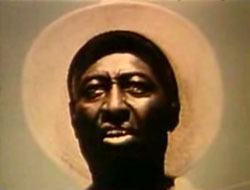 The three pieces of films strung together for this film originated as a folklore research film in 1945, shot by Blanding Sloan and Wah Ming Chang, then edited by Pete Singer of the Weavers. The three pieces of films strung together for this film originated as a folklore research film in 1945, shot by Blanding Sloan and Wah Ming Chang, then edited by Pete Singer of the Weavers.
Wah Chang was a sculpter & cinematographer who did much of the stop-motion animation & model building for George Pal's Tom Thumb (1958) & created the headdress worn by Liz Taylor in Cleopatra (1963) among other career highlights. Blanding Sloan was a successful watercolorist, puppeteer, & illustrator, having been in his youth a set designer for Florence Ziegfield.
The one-reeler is a mite over ten minutes of which 8 minutes is the research footage. It opens with shots of the rural south & of the Shilo Baptist Church in Morningsport, Louisiana, with Leadbelly on the soundtrack humming & strumming the plaintive "Where Did You Sleep Last Night?" behind the opening credits.
A minute & a half into the film, the research footage begins, in faded color, as Leadbelly standing out doors in the bright sunlight introduces his song with a short rap about cotton picking beginning with "And this is another work song," indicating he sang others before the film started.
The snappy work song is "Pick a Bale o' Cotton," still a folky favorite, & bound to thrill children. As he sings "O Lordy, pick a bale o' cotton/ O Lordy, pick a bale a day," we see Leadbelly filmed from below as if he's on a hilltop big as a giant, but with some close-ups of his wonderful face as well.
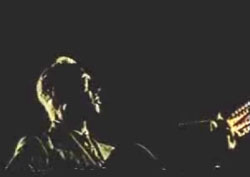 He's picking his guitar faster & faster, & with each verse sings the song more rapidly until the speed is astounding & a wonder that he can do the lyrics that fast! He's picking his guitar faster & faster, & with each verse sings the song more rapidly until the speed is astounding & a wonder that he can do the lyrics that fast!
The verses are about he & his wife picking a bale a day, he & his buddy picking a bale a day, "me & my pappy," and "me & my sister." In some versions of this song it refers to picking the cotton for the "massah" but Leadbelly wouldn't sing that.
The screen goes black & we hear Leadbelly strumming. Suddenly he appears in the darkness with his guitar & again says, "This is a work song." There's hardly any lighting so he seems little more than shadow against night, in the sharpest of sharp contrasts to the "Bale of Cotton" shot in brightest light.
He sings the story-song "The Grey Goose," at one point holding his guitar like a weapon to the lyric "the gun went off," shooting a goose that couldn't be killed & couldn't be eaten. It's no less beautifully sung for being comedic.
The screen goes black again & we hear Leadbelly saying, "This is a different king of work song." As his short rap comes to a close & he begins to sing, the lights come up, & there he is in yet another setting, against a stage curtain, his hair white.
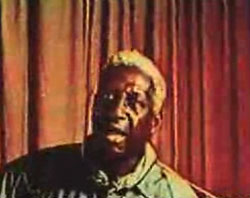 With his surprisingly youn"g voice he sings "Take this Hammer," swaying rapidly from side to side as if struggling up a hill with his legs chained tied together: With his surprisingly youn"g voice he sings "Take this Hammer," swaying rapidly from side to side as if struggling up a hill with his legs chained tied together:
"Take this hammer, & carry to the captain, haah!/ Take this hammer, & carry it to the captain, haah!/ Take this hammer, haah!, & carry it to the captain -- haah!/ You tell 'im I'm gone. You tell 'im I'm gone." A different kind of work song indeed, as it's about an escape from a chain gang.
The film ends with a few shots of a rural graveyard, as all too soon it's over. This is the sum total of all the known film footage of Huddy "Leadbelly" Leadbetter, one of the greatest of the early bluesmen. He's so cool on film I'm shocked filmmakers weren't tripping on each other to film his performances.
Three Songs by Leadbelly can be found on Blues Masters: The Essential History of the Blues V (1966) & elsewhere, or can be quickly accessed at youtube.
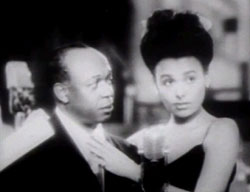 Filmed by the Armed Forces Roadio Service, Jubilee: G. I. Journal (1942) captured visually a typical episode of the radio series Jubilee (1942-1953). Filmed by the Armed Forces Roadio Service, Jubilee: G. I. Journal (1942) captured visually a typical episode of the radio series Jubilee (1942-1953).
However, the radio shows were a half-hour each & the filmed episode is a one-reeler about ten minutes. Because what is filmed is a radio show, the dialogue is read by the cast from scripts they carry with them to & from a microphone.
The jump-jazz & swing variety radio programs were recorded on discs in Los Angeles & shipped overseas for the Armed Forces Radio to air especially for black troops.
The radio show featured the top performers of the era, mostly but by no means exclusively black artists like Lena Horne, Lionel Hampton, Count Basie, Ella Mae Morse, Nat King Cole, Lucky Millinder & His Orchestra, Delta Rhythm Boys, Duke Ellington, Louis Jordan, & so many others. Occasional white performers included Jack Benny, Gene Krupa, & Jack Teagarden.
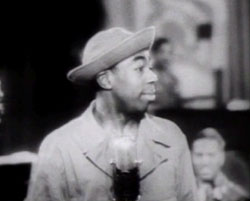 Ernie "Bubbles" Whitman serves as master of ceremonies. He'd been seen in a number of films, as Pharaoh in Green Pastures (1936), as Jimmy Europe in Stormy Weather (1943), & less respectably as King Malaba in Drums of the Congo (1942), among many others. Ernie "Bubbles" Whitman serves as master of ceremonies. He'd been seen in a number of films, as Pharaoh in Green Pastures (1936), as Jimmy Europe in Stormy Weather (1943), & less respectably as King Malaba in Drums of the Congo (1942), among many others.
Ernie has a funny line of dialogue or two then introduces Eddie "Rochester" Anderson so they can continue shtick for another sentence or two, at which point Lena Horne is introduced. Ernie leaves the stage, leaving Eddie & Lena at the microphone.
Eddie & Lena sing "(Life's Full of) Consequence," which was Ernie's big number in Cabin in the Sky (1943). He sings it better in the movie; toward the end he's practically just screaming the lyrics here, & Lena looks a mite amused by his caterwallering. But what the hey, a chance to see Eddie "Rochester" Anderson & Lena Horne performing together is beyond wondrous.
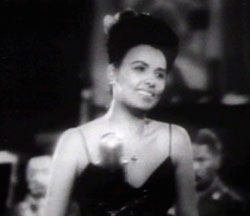 The pacing is kept rapid. Private Emmet "Babe" Wallace & Timmy Rogers do some stand-up with m.c. Ernie, not terribly funny alas, but then Timmy starts singing quite a funny song about getting drafted, "Bring Enough Clothes for Three Days," to a boogy beat. The pacing is kept rapid. Private Emmet "Babe" Wallace & Timmy Rogers do some stand-up with m.c. Ernie, not terribly funny alas, but then Timmy starts singing quite a funny song about getting drafted, "Bring Enough Clothes for Three Days," to a boogy beat.
Timmy's a cutie, a comedy star to Black America. He was not nearly as well known to whites, though some may remember him as Smiley Rogers on Sanford & Son. His death in 2006 was scarsely remarked upon anywhere, sad to say, & the Jubilee film special is an all too rare chance to see a moment of his stage persona.
Lena returns center stage to speak caringly directly to the soldiers. During this period Lena entertained the troops on bases in the USA, on both coasts, & was a recurring guest on the Jubilee radio shows.
So when she speaks to the lads at the front, it would've been a moving thing. She then sings "That Man I Love" as if to a soldier whose return she awaits, which was every soldier. In the background, uncredited, we can see the Jimmy Lunceford Orchestra in their military uniforms.
copyright © by Paghat the Ratgirl
|
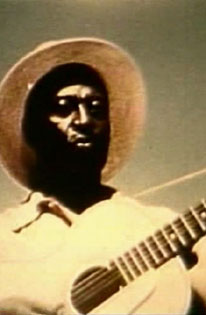
 The three pieces of films strung together for this film originated as a folklore research film in 1945, shot by Blanding Sloan and Wah Ming Chang, then edited by Pete Singer of the Weavers.
The three pieces of films strung together for this film originated as a folklore research film in 1945, shot by Blanding Sloan and Wah Ming Chang, then edited by Pete Singer of the Weavers. He's picking his guitar faster & faster, & with each verse sings the song more rapidly until the speed is astounding & a wonder that he can do the lyrics that fast!
He's picking his guitar faster & faster, & with each verse sings the song more rapidly until the speed is astounding & a wonder that he can do the lyrics that fast! With his surprisingly youn"g voice he sings "Take this Hammer," swaying rapidly from side to side as if struggling up a hill with his legs chained tied together:
With his surprisingly youn"g voice he sings "Take this Hammer," swaying rapidly from side to side as if struggling up a hill with his legs chained tied together:
 Ernie "Bubbles" Whitman serves as master of ceremonies. He'd been seen in a number of films, as Pharaoh in
Ernie "Bubbles" Whitman serves as master of ceremonies. He'd been seen in a number of films, as Pharaoh in  The pacing is kept rapid. Private Emmet "Babe" Wallace & Timmy Rogers do some stand-up with m.c. Ernie, not terribly funny alas, but then Timmy starts singing quite a funny song about getting drafted, "Bring Enough Clothes for Three Days," to a boogy beat.
The pacing is kept rapid. Private Emmet "Babe" Wallace & Timmy Rogers do some stand-up with m.c. Ernie, not terribly funny alas, but then Timmy starts singing quite a funny song about getting drafted, "Bring Enough Clothes for Three Days," to a boogy beat.